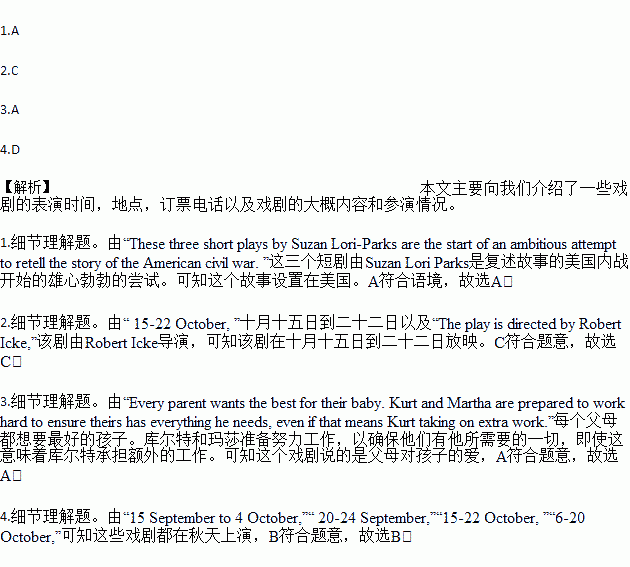题目内容
Plays
Father Comes Home from the Wars (Parts 1, 2 & 3)
These three short plays by Suzan Lori-Parks are the start of an ambitious attempt to retell the story of the American civil war. The focus is on a slave promised his freedom by his master if he joins in the fight against the Union. Steve Toussaint and Jimmy Akingbola head the cast, and Jo Bonney is in charge.
• 15 September to 4 October, Royal Court, London. Box office: 020-7565 5000.
A Pacifist’s Guide to the War on Cancer
Bryony Kimmings and Brian Lobel consider our attitudes to cancer and the language we employ to deal with it through the stories of five people. This is an all-singing, all-dancing affair with music by Tom Parkinson, wiping off the pink charity ribbons to look at the realities of diagnosis(诊断)and what it means for the wider family.
• 20-24 September, Home, Manchester. Box office: 0161-200 1500.
The Nest
Every parent wants the best for their baby. Kurt and Martha are prepared to work hard to ensure theirs has everything he needs, even if that means Kurt taking on extra work. Franz Xaver Kroetz’s extraordinary play about the damage that profit causes to individuals and the environment gets a new translation from Conor McPherson.
• 15-22 October, Lyric, Belfast. Box office: 028-9038 1081.
The Red Barn
David Hare’s new play is based on La Main, a psychological thriller by the great Georges Simenon. The story concerns two couples who, on their way back from a party, struggle through the snow. The play is directed by Robert Icke, and the cast is headed by Mark Strong and Hope Davis.
• 6-20 October, Lyttelton, London. Box office: 020-7452 3000.
1.What do we know about Father Comes Home from the Wars?
A. It is set in the USA.
B. It is put on throughout September.
C. It tells of the hardship slaves suffered.
D. It is the first play to describe the cruelty of war.
2.When can you see the play directed by Robert Icke?
A. 19 September. B. 3 October.
C. 10 October. D. 21October.
3.In which play can we feel parents’ love for children?
A. The Nest
B. The Red Barn
C. Father Comes Home from the Wars
D. A Pacifist’s Guide to the War on Cancer
4.What do the plays mentioned in the text have in common?
A. They are all comedies. B. They are put on in autumn.
C. They are highly thought of. D. They are works of the same writer.

